中考动词时态复习含练习(62张ppt)
文档属性
| 名称 | 中考动词时态复习含练习(62张ppt) |
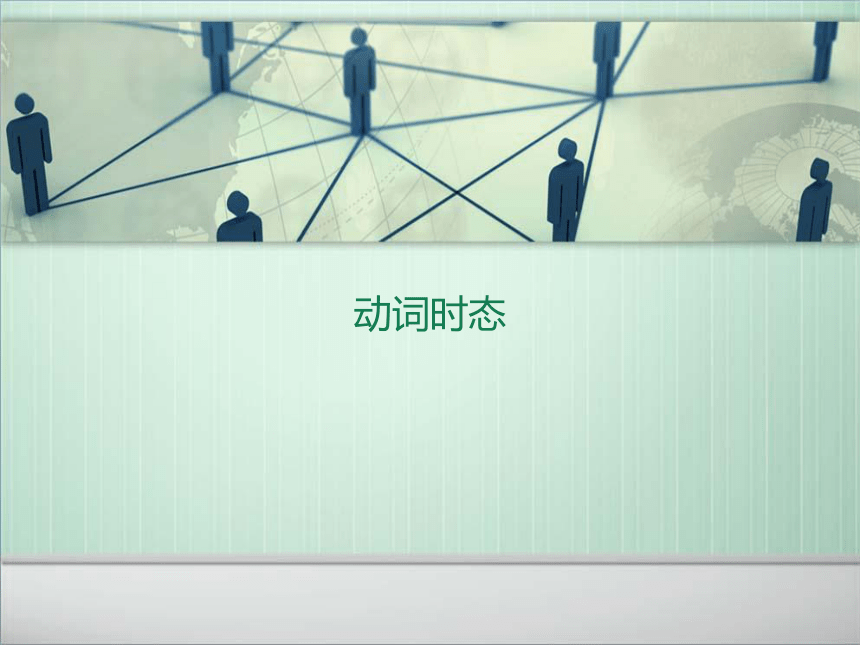
|
|
| 格式 | zip | ||
| 文件大小 | 112.8KB | ||
| 资源类型 | 教案 | ||
| 版本资源 | 通用版 | ||
| 科目 | 英语 | ||
| 更新时间 | 2012-03-13 00:00:00 | ||
图片预览

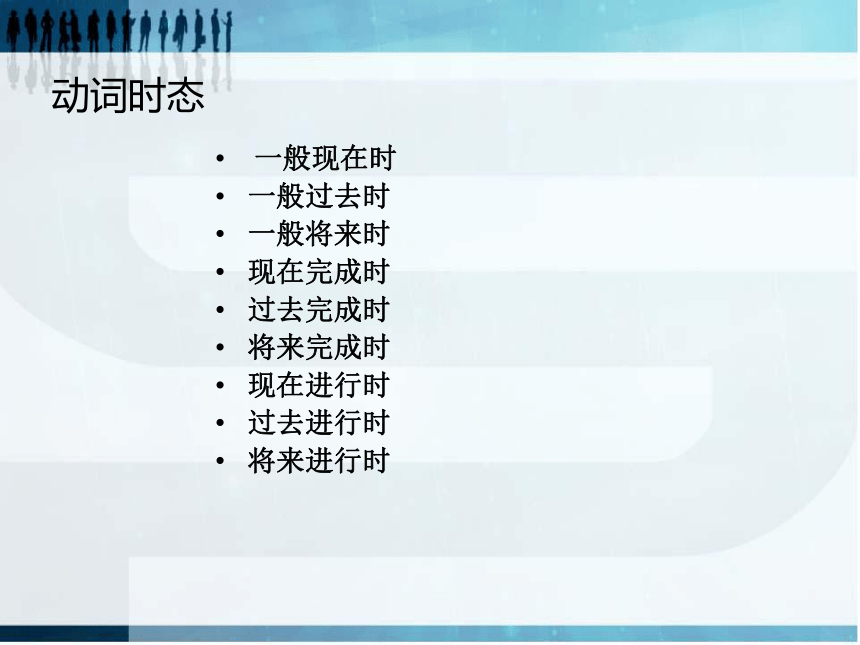
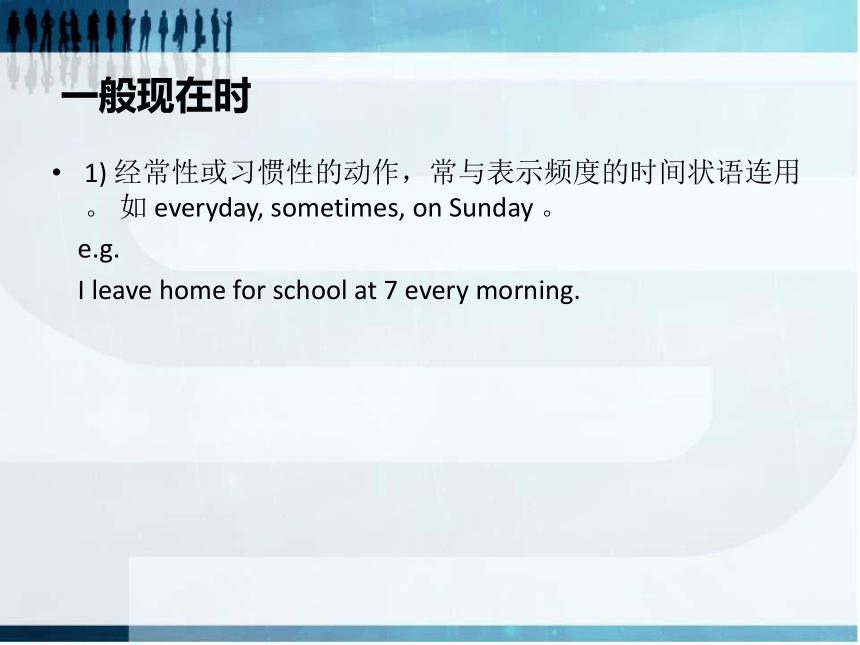
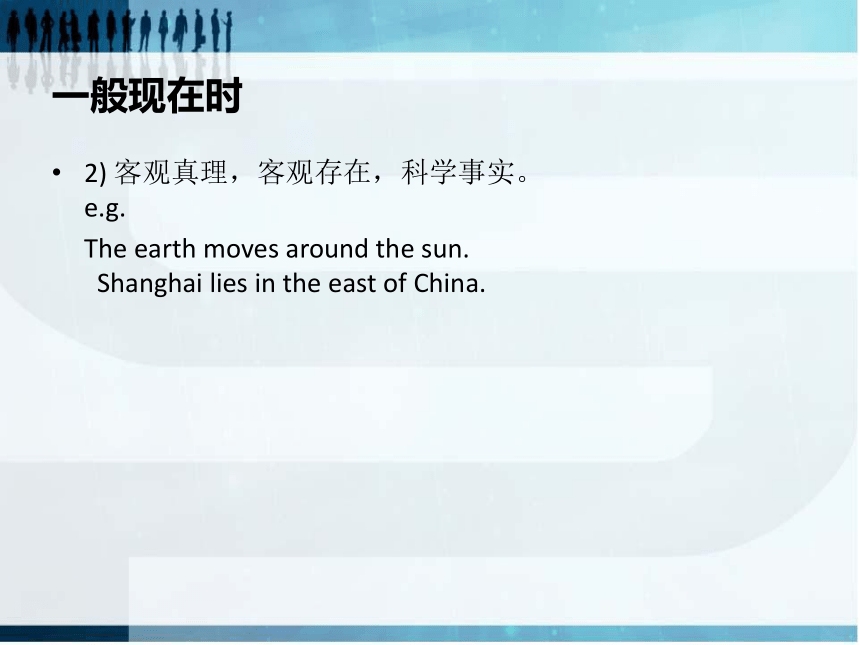
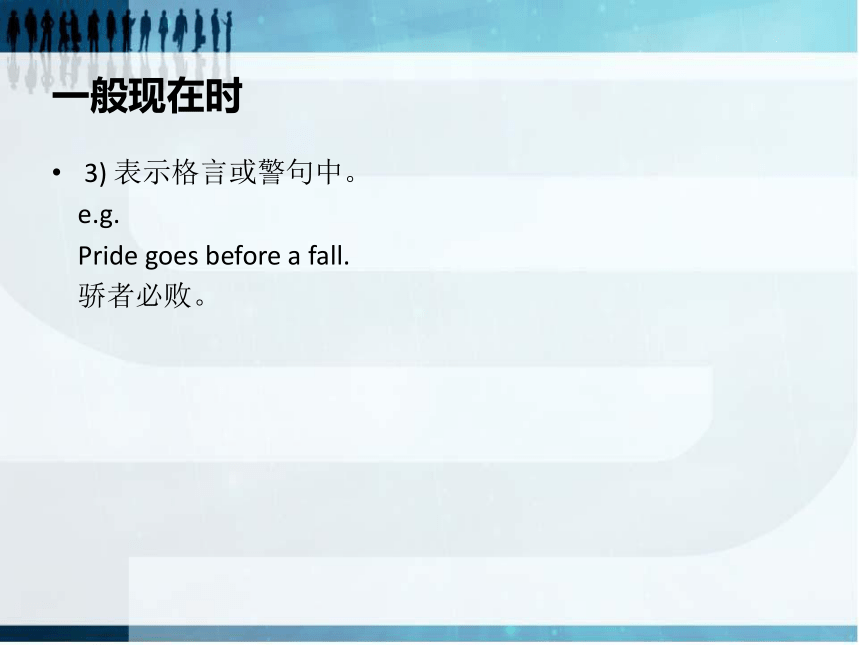
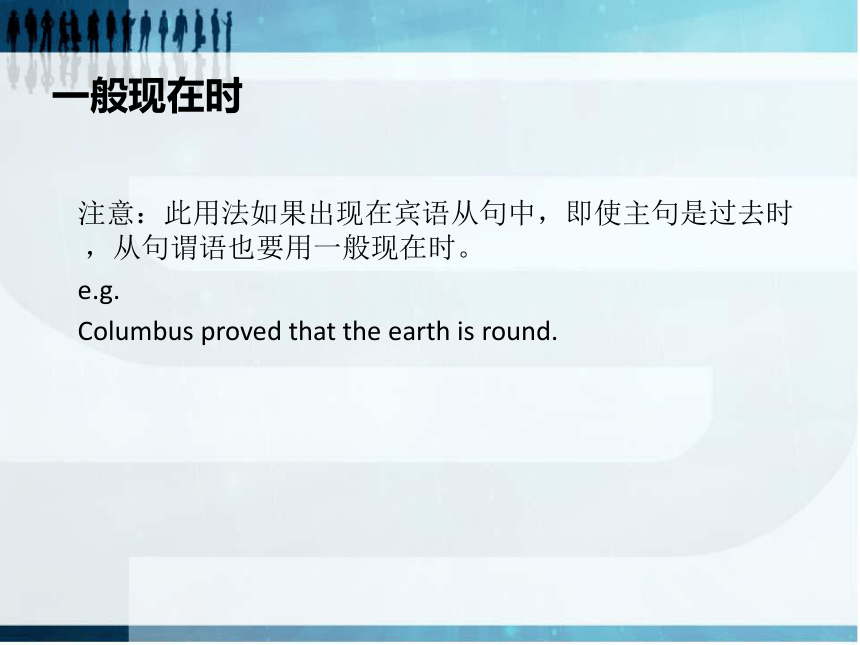
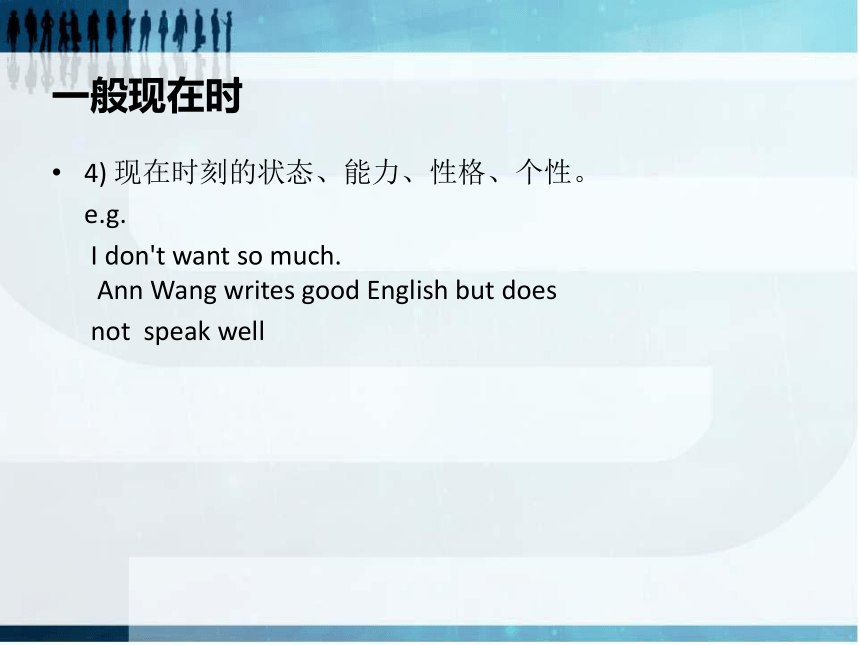
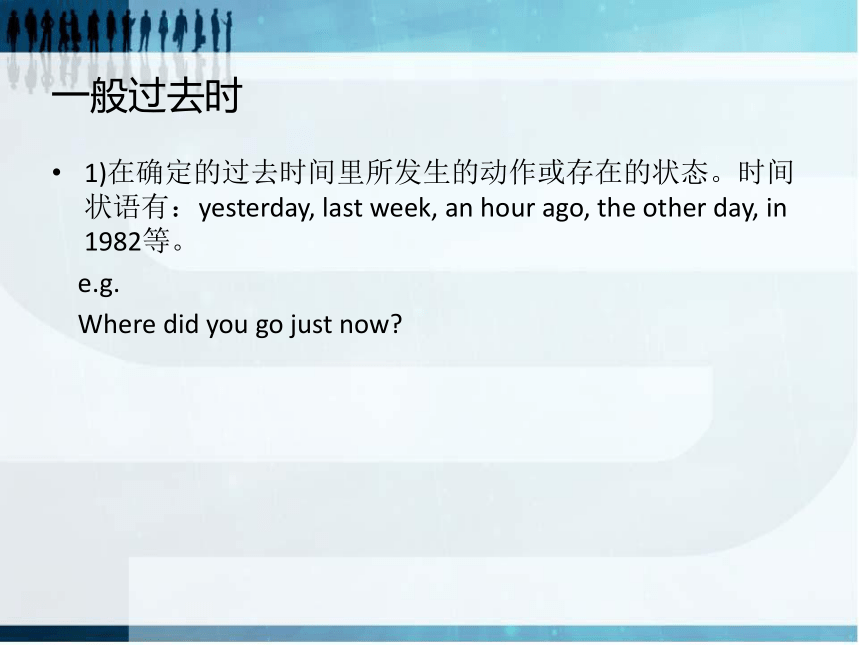
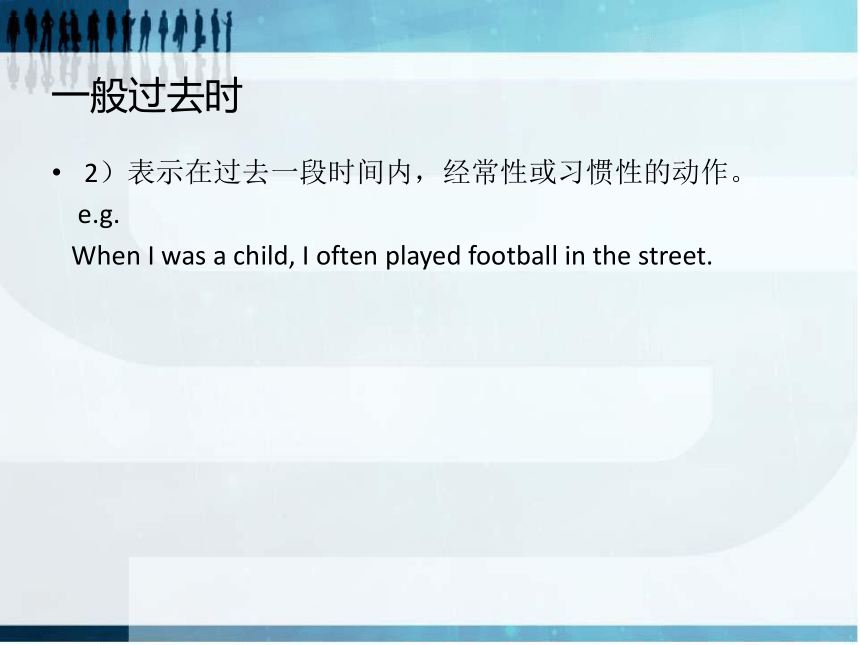
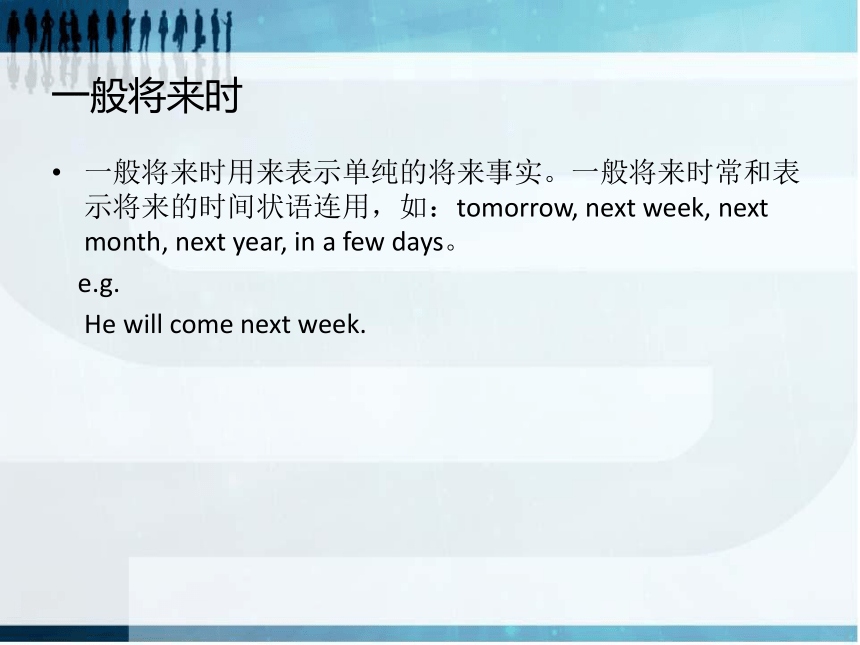
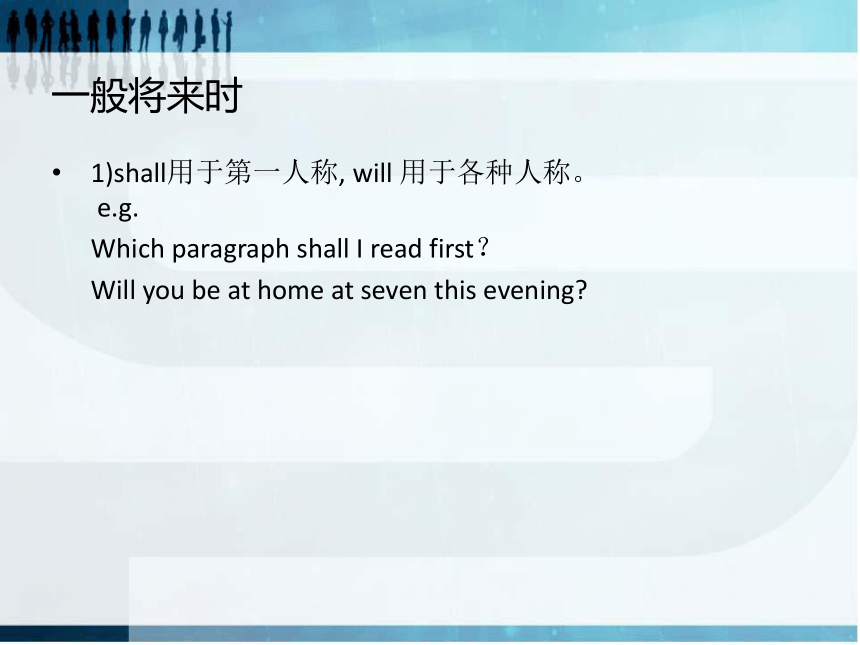
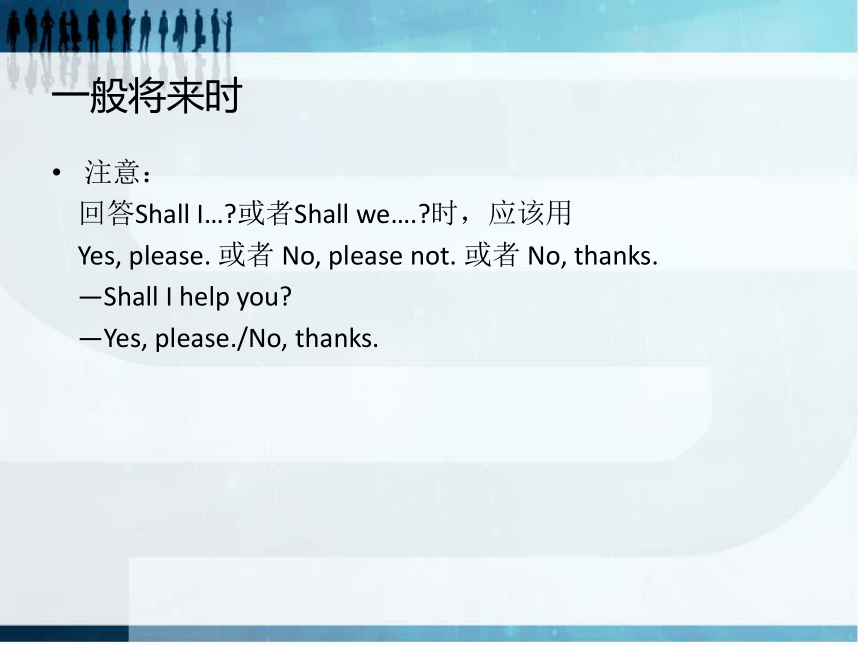
文档简介
(共63张PPT)
动词时态
动词时态
一般现在时
一般过去时
一般将来时
现在完成时
过去完成时
将来完成时
现在进行时
过去进行时
将来进行时
一般现在时
1) 经常性或习惯性的动作,常与表示频度的时间状语连用。 如 everyday, sometimes, on Sunday 。
e.g.
I leave home for school at 7 every morning.
一般现在时
2) 客观真理,客观存在,科学事实。 e.g.
The earth moves around the sun. Shanghai lies in the east of China.
一般现在时
3) 表示格言或警句中。
e.g.
Pride goes before a fall.
骄者必败。
一般现在时
注意:此用法如果出现在宾语从句中,即使主句是过去时,从句谓语也要用一般现在时。
e.g.
Columbus proved that the earth is round.
一般现在时
4) 现在时刻的状态、能力、性格、个性。
e.g.
I don't want so much. Ann Wang writes good English but does
not speak well
一般过去时
1)在确定的过去时间里所发生的动作或存在的状态。时间状语有:yesterday, last week, an hour ago, the other day, in 1982等。
e.g.
Where did you go just now
一般过去时
2)表示在过去一段时间内,经常性或习惯性的动作。
e.g.
When I was a child, I often played football in the street.
一般将来时
一般将来时用来表示单纯的将来事实。一般将来时常和表示将来的时间状语连用,如:tomorrow, next week, next month, next year, in a few days。
e.g.
He will come next week.
一般将来时
1)shall用于第一人称, will 用于各种人称。 e.g.
Which paragraph shall I read first?
Will you be at home at seven this evening
一般将来时
注意:
回答Shall I… 或者Shall we…. 时,应该用
Yes, please. 或者 No, please not. 或者 No, thanks.
—Shall I help you
—Yes, please./No, thanks.
一般将来时
2)be going to +不定式,表示将来
a. 主语的意图,即将做某事。 What are you going to do tomorrow
b. 计划,安排要发生的事。 The play is going to be produced next month。
c. 有迹象要发生的事 Look at the dark clouds, there is going to be a storm.
一般将来时
3) be +不定式表将来,按计划或正式安排
将发生的事。 e.g.
We are to discuss the report next Saturday.
一般将来时
4) be about to +不定式,意为马上做某事。 e.g.
He is about to leave for Beijing.
注意:
be about to 不能与tomorrow, next week 等
表示明确将来时的时间状语连用。
一般将来时
5 )be to和be going to
be to 表示客观安排或受人指示而做某事。 be going to 表示主观的打算或计划。 e.g.
I am to play football tomorrow afternoon.
(客观安排) I'm going to play football tomorrow afternoon. (主观安排)
一般将来时
6)一般现在时表将来
1)下列动词:come, go, arrive, leave, start, begin, return的一般现在时表将来。这主要用来表 示在时间上已确定或安排好的事情。 e.g.
The train leaves at six tomorrow morning. When does the bus star It stars in ten minutes.
一般将来时
2)倒装句,表示动作正在进行,如: Here comes the bus. = The bus is coming. There goes the bell. = The bell is ringing.
一般将来时
3)在时间或条件句中。 When Bill comes ,ask him to wait for me.
(不是when Bill will come), I'll write to you as soon as I arrive there.
一般将来时
4)在动词hope, take care that, make sure that等 后。 e.g.
I hope they have a nice time next week. Make sure that the windows are closed before you leave the room
一般将来时
7)用现在进行时表示将来
意为:“意图”、“打算”、“安排”、常用于人。常用词为 come, go, start, arrive, leave, stay等 e.g.
I'm leaving tomorrow. Are you staying here till next week
现在完成时
现在完成时的形式: have (has) +过去分词。
有“继续”、“经验”、“完成”、“结果”等用法。
Have/has+
过去分词 继续 表示从过去继续到现在的动作或者状态。
经验 表示过去某时刻到现在的经验。
完成 表示现在刚完成的动作。
结果 表示现在是“做了…”的结果
现在完成时
1)表示继续的现在完成时。
说明过去的动作一直延续到现在,也就是说从过去某时开始的动作、状态,一直持续到现在。
e.g.
I have studied English since three years ago.
现在完成时
2)表示经验的现在完成时
说明从过去起到现在的经验,即从过去到现在之间曾经经历过或者做过的事情。
e.g.
Helen has read the novel three times.
现在完成时
3)表示完成、结果的现在完成时
“完成”意思为“刚做完…”或者“做完了…”,表示过去开始的动作现在刚结束,即在说话之前刚刚结束。
e.g.
I’ve just finished my homework.
They have gone to Guilin.
现在完成时
4)比较过去时与现在完成时
过去时表示过去某时发生的动作或单纯叙述过去的事情,强调动作;现在完成时为过去发生的,强调过去的事情对现在的影响,强调的是影响。
现在完成时
过去时常与具体的时间状语连用,而现在完成时通常与模糊的时间状语连用,或无时间状语。 一般过去时的时间状语: yesterday, last week,…ago, in1980, in October, just now, 具体的时间状语
现在完成时
共同的时间状语: this morning, tonight,this April, now, once,before, already, recently,lately
现在完成时的时间状语 for, since, so far, ever, never, just, yet, till / until, up to now, in past years, always, 不确定的时间状语
现在完成时
现在完成时可表示持续到现在的动作或状态,动词一般是延续性的,如live, teach, learn, work, study, know.过去时常用的非持续性动词有come, go, leave, start, die, finish, become, get married等。
现在完成时
举例:
I saw this film yesterday.
(强调看的动作发生过了。)
I have seen this film.
(强调对现在的影响,电影的内容已经知道了。)
现在完成时
Why did you get up so early
(强调起床的动作已发生过了。)
Who hasn't handed in his paper
(强调有卷子,可能为不公平竞争。)
现在完成时
He has been in the League for three years.
(在团内的状态可延续)
He has been a League member for three years.
(是团员的状态可持续)
He joined the League three years ago.
( 三年前入团,joined为短暂行为。)
过去完成时
概念:表示过去的过去 其构成是had +过去分词构成。
2) 用法 a. 在told, said, knew, heard, thought等动词后的宾语从句。 She said (that) she had never been to Paris.
过去完成时
b. 状语从句 在过去不同时间发生的两个动作中,发生在先,用过去完成时;发生在后,用一般过去时。 When the police arrived, the thieves had run away.
c. 表示意向的动词,如hope, wish, expect, think, intend, mean, suppose等,用过去完成时表示 "原本…,未能…" We had hoped that you would come, but you didn't.
过去完成时
3) 过去完成时的时间状语before, by, until , when, after, once, as soon as。
He said that he had learned some English before.
By the time he was twelve, Edison had began to make a living by himself.
Tom was disappointed that most of the guests had left when he arrived at the party.
过去完成时
4)用一般过去时代替完成时
两个动作如按顺序发生,又不强调先后,或用then,and,but 等连词时,多用一般过去时。
When she saw the mouse,she screamed.
My aunt gave me a hat and I lost it.
过去完成时
两个动作相继发生,可用一般过去时;如第一个动作需要若干时间完成,用过去完成 When I heard the news, I was very excited.
叙述历史事实,可不用过去完成时,而只用一般过去时。 Our teacher told us that Columbus discovered America in 1492
将来完成时
1) 构成will / be going to do sth.
2) 概念 a. 状态完成:表示某事继续到将来某一时为止一直有的状态。 b. 动作完成:表示将来某一时或另一个将来的动作之前,已经完成的动作或一获得的经验。 They will have been married for 20 years by then. You will have reached Shanghai by this time tomorrow.
现在进行时
现在进行时的基本用法: a. 表示现在( 指说话人说话时) 正在发生的事情。 We are waiting for you. b. 习惯进行:表示长期的或重复性的动作,说话时动作未必正在进行。 Mr. Green is writing another novel. (说话时并未在写,只处于写作的状态。) She is learning piano under Mr. Smith.
现在进行时
c. 表示渐变的动词有:get, grow, become, turn, run, go, begin等。 The leaves are turning red. It's getting warmer and warmer.
d. 与always, constantly, forever 等词连用,表示反复发生的动作或持续存在的状态,往往带有说话人的主观色彩。 You are always changing your mind.
现在进行时
2)不用进行时的动词
事实状态的动词 have, belong, possess, cost, owe, exist, include, contain, matter, weigh, measure, continue I have two brothers. This house belongs to my sister.
现在进行时
心理状态的动词 Know, realize, think see, believe, suppose, imagine, agree, recognize, remember, want, need, forget, prefer, mean, understand, love, hate I need your help. He loves her very much.
现在进行时
瞬间动词 accept, receive, complete, finish, give, allow, decide, refuse. I accept your advice.
系动词 seem, remain, lie, see, hear, smell, feel, taste, get, become, turn You seem a little tired
过去进行时
概念:表示过去某时正在进行的状态或动作。过去进行时的主要用法是描述一件事发生的背景;一个长动作发生的时候,另一个短动作发生。
过去进行时
3) 常用的时间状语 this morning, the whole morning, all day yesterday, from nine to ten last evening, when, while My brother fell while he was riding his bicycle and hurt himself. It was raining when they left the station. When I got to the top of the mountain, the sun was shining.
将来进行时
1) 概念:表示将来某时进行的状态或动作,或按预测将来会发生的事情。 She'll be coming soon. I'll be meeting him sometime in the future. 注意:将来进行时不用于表示"意志",不能说 I'll be having a talk with her.
将来进行时
2)常用的时间状语 Soon, tomorrow, this evening,on Sunday, by this time,tomorrow, in two days, tomorrow evenin By this time tomorrow, I'll be lying on the beach.
动词时态填空专项练习
1.So far we _____________(learn) ten thousand English words.
2.I will go to see my friend if it _____________(not rain) tomorrow.
3.---________you ever _________(speak) to a foreigner before
--- Not yet.
4.Students usually __________(have) ten minutes’ rest between two classes.
5.The newspaper__________(come) an hour ago, but I ___________(not read).
have learned
doesn’t rain
Have spoken
have
came
haven’t read
6.They have little time ____________(play) on Sunday.
7.Don’t worry. He ______________(catch) up with the others soon.
8._________she ever _________(spit) on the ground
9.That truck_____________(collect) rubbish at this time yesterday.
10.It ___________(be) three years since Lily ________(join) the Green.
to play
will catch
Has spat
was collecting
is
joined
11.__________(take) care of our environment is very important.
12.__________you ever___________(throw) any litter on the
ground
13.---_______your mother __________(come ) back
---Yes, she __________(come) back a moment ago.
14.---How long ________you_________(wait) for the bus here
---Ten minutes.
15.---Where is Liu Mei ---She____________(go) home.
Taking
Have thrown
Has come
came
Have waited
has gone
16.The boy ______________(not swim) in the river yet.
17.I ___________(find) my ruler in my desk five minutes ago.
18.My mother ___________(buy) vegetables on her way home every day.
19.Look at the clouds. It____________ (rain).
20.Look! The boy ______________(put) on his sweater by himself.
hasn’t swum
found
buys
is going to rain
is putting
21.What _________Li Lei__________(do) when the teacher came in
22.She__________(do) her homework every evening.
23.If he __________(come) this afternoon, I won’t go out.
24.Would you like ____________(go) out for a walk,please
25.Our teacher often makes us _______(do) a lot of homework.
was doing
does
comes
to go
do
26.---What ________your friend__________(do)
---He______________(draw) a beautiful horse now.
27.---______you________(be) free tomorrow afternoon
---Yes ,I________.
28.---What _________he__________(do)last night
---He ___________(go) to see a film.
29.I______________(call) you as soon as I ________(get) there.
30.---What ________you __________(do)at this time yesterday
---I______________(read) a book.
is doing
is drawing
Will be
will
did do
went
will call
get
were doing
was reading
31. ---______Tom_______(clean) his room yet
---Yes, he______.
---When_______he_________(clean) it
---He__________(clean) it just now.
32.---______you ever ______(eat)fish and chips
---No,I______. But I__________(eat) sandwiches.
---When_______you______(eat) it
---Two weeks ago.
Has clean
has
did clean
cleaned
Have eaten
haven’t
have eaten
did eat
33.I ___________(do) my homework from
seven to nine last night.
34.He________(feel) sick yesterday.
35.His father___________(be) ill ever since
last spring.
36.---_______you_______(take) the medicine
---Yes,I_______
---When_______you_______(take) it
---A moment ago.
was doing
felt
has been
Have taken
have
did take
37.The bus__________(arrive). It________(arrive) just now.
Look, your father_________(get) off it.
38.I___________(buy) a pen. I________(buy) it
last month. I____________(buy) it for a
month.
39.My father __________(go) to Beijing.
He___________(go) there for three days.
40.I____________(go) to my hometown
three times.
has arrived
arrived
is getting
have bought
bought
have had
has gone
has been
have been
41.My aunt__________(teach) English since 1985.
42.He____________(finish) writing the book,
hasn’t he
43.I____________(know) him for over five years.
44.We_____________(learn)2000 English words
already.
45.---______you_______(see) this film before
---Yes, I_________(see) it last Friday.
46.______the train________(arrive) yet Not yet.
has taught
has finished
have known
have learned
Have seen
saw
Has arrived
47.His grandpa______________(die) since
three months ago.
48.They_________(come) to Hangzhou in 1996
and ___________(live) here ever since.
49.How long_______you_________(borrow)
this book For two weeks.
50.People can hear the little girl________(practise) spesking English every
morning.
has been dead
came
have lived
have kept
practise
51.Ten years ________________(pass) already.
52.He says that he______________(not come) tomorrow.
53.Lin Tao told Jim that they_______(have) a football match yesterday.
54.Our teacher told us that light______(travel)
faster than sound.
55.Our English teacher told us _________(read ) English every day.
has passed
won’t come
had
travels
to read
tell sb. to do sth.
56.What _________you __________(do) since you came here
57.I’m afraid of___________(sleep) alone.
58.Betty__________already_________(write) a letter to her penfriend.
59.__________(cut) down too many trees is bad for people.
60.There are many workers________(work) in the factory.
have done
sleeping
has written
Cutting
working
61.We________________(visit) the great scientist three times so far.
62.Don’t forget___________(call) me tonight.
63.I_______________(not see) him for a long time.
64.________Jim ever__________(step) on the grass in the park
65.He_______________(look) out of the window when the match_____________(begin).
have visited
to call
haven’t seen
Has stepped
was looking
began
66.They______________(not see) each other since they ____________(finish) their school.
67.He _______________(work) on the maths problems since seven o’clock. He _____________(work) on it for two hours. I’m sure he ____________(work) it out in one hour.
68.My mother _______________(cook) at six yesterday evening. At that time father____________(read).
haven’t seen
finished
has worked
has worked
will work
was cooking
was reading
动词时态
动词时态
一般现在时
一般过去时
一般将来时
现在完成时
过去完成时
将来完成时
现在进行时
过去进行时
将来进行时
一般现在时
1) 经常性或习惯性的动作,常与表示频度的时间状语连用。 如 everyday, sometimes, on Sunday 。
e.g.
I leave home for school at 7 every morning.
一般现在时
2) 客观真理,客观存在,科学事实。 e.g.
The earth moves around the sun. Shanghai lies in the east of China.
一般现在时
3) 表示格言或警句中。
e.g.
Pride goes before a fall.
骄者必败。
一般现在时
注意:此用法如果出现在宾语从句中,即使主句是过去时,从句谓语也要用一般现在时。
e.g.
Columbus proved that the earth is round.
一般现在时
4) 现在时刻的状态、能力、性格、个性。
e.g.
I don't want so much. Ann Wang writes good English but does
not speak well
一般过去时
1)在确定的过去时间里所发生的动作或存在的状态。时间状语有:yesterday, last week, an hour ago, the other day, in 1982等。
e.g.
Where did you go just now
一般过去时
2)表示在过去一段时间内,经常性或习惯性的动作。
e.g.
When I was a child, I often played football in the street.
一般将来时
一般将来时用来表示单纯的将来事实。一般将来时常和表示将来的时间状语连用,如:tomorrow, next week, next month, next year, in a few days。
e.g.
He will come next week.
一般将来时
1)shall用于第一人称, will 用于各种人称。 e.g.
Which paragraph shall I read first?
Will you be at home at seven this evening
一般将来时
注意:
回答Shall I… 或者Shall we…. 时,应该用
Yes, please. 或者 No, please not. 或者 No, thanks.
—Shall I help you
—Yes, please./No, thanks.
一般将来时
2)be going to +不定式,表示将来
a. 主语的意图,即将做某事。 What are you going to do tomorrow
b. 计划,安排要发生的事。 The play is going to be produced next month。
c. 有迹象要发生的事 Look at the dark clouds, there is going to be a storm.
一般将来时
3) be +不定式表将来,按计划或正式安排
将发生的事。 e.g.
We are to discuss the report next Saturday.
一般将来时
4) be about to +不定式,意为马上做某事。 e.g.
He is about to leave for Beijing.
注意:
be about to 不能与tomorrow, next week 等
表示明确将来时的时间状语连用。
一般将来时
5 )be to和be going to
be to 表示客观安排或受人指示而做某事。 be going to 表示主观的打算或计划。 e.g.
I am to play football tomorrow afternoon.
(客观安排) I'm going to play football tomorrow afternoon. (主观安排)
一般将来时
6)一般现在时表将来
1)下列动词:come, go, arrive, leave, start, begin, return的一般现在时表将来。这主要用来表 示在时间上已确定或安排好的事情。 e.g.
The train leaves at six tomorrow morning. When does the bus star It stars in ten minutes.
一般将来时
2)倒装句,表示动作正在进行,如: Here comes the bus. = The bus is coming. There goes the bell. = The bell is ringing.
一般将来时
3)在时间或条件句中。 When Bill comes ,ask him to wait for me.
(不是when Bill will come), I'll write to you as soon as I arrive there.
一般将来时
4)在动词hope, take care that, make sure that等 后。 e.g.
I hope they have a nice time next week. Make sure that the windows are closed before you leave the room
一般将来时
7)用现在进行时表示将来
意为:“意图”、“打算”、“安排”、常用于人。常用词为 come, go, start, arrive, leave, stay等 e.g.
I'm leaving tomorrow. Are you staying here till next week
现在完成时
现在完成时的形式: have (has) +过去分词。
有“继续”、“经验”、“完成”、“结果”等用法。
Have/has+
过去分词 继续 表示从过去继续到现在的动作或者状态。
经验 表示过去某时刻到现在的经验。
完成 表示现在刚完成的动作。
结果 表示现在是“做了…”的结果
现在完成时
1)表示继续的现在完成时。
说明过去的动作一直延续到现在,也就是说从过去某时开始的动作、状态,一直持续到现在。
e.g.
I have studied English since three years ago.
现在完成时
2)表示经验的现在完成时
说明从过去起到现在的经验,即从过去到现在之间曾经经历过或者做过的事情。
e.g.
Helen has read the novel three times.
现在完成时
3)表示完成、结果的现在完成时
“完成”意思为“刚做完…”或者“做完了…”,表示过去开始的动作现在刚结束,即在说话之前刚刚结束。
e.g.
I’ve just finished my homework.
They have gone to Guilin.
现在完成时
4)比较过去时与现在完成时
过去时表示过去某时发生的动作或单纯叙述过去的事情,强调动作;现在完成时为过去发生的,强调过去的事情对现在的影响,强调的是影响。
现在完成时
过去时常与具体的时间状语连用,而现在完成时通常与模糊的时间状语连用,或无时间状语。 一般过去时的时间状语: yesterday, last week,…ago, in1980, in October, just now, 具体的时间状语
现在完成时
共同的时间状语: this morning, tonight,this April, now, once,before, already, recently,lately
现在完成时的时间状语 for, since, so far, ever, never, just, yet, till / until, up to now, in past years, always, 不确定的时间状语
现在完成时
现在完成时可表示持续到现在的动作或状态,动词一般是延续性的,如live, teach, learn, work, study, know.过去时常用的非持续性动词有come, go, leave, start, die, finish, become, get married等。
现在完成时
举例:
I saw this film yesterday.
(强调看的动作发生过了。)
I have seen this film.
(强调对现在的影响,电影的内容已经知道了。)
现在完成时
Why did you get up so early
(强调起床的动作已发生过了。)
Who hasn't handed in his paper
(强调有卷子,可能为不公平竞争。)
现在完成时
He has been in the League for three years.
(在团内的状态可延续)
He has been a League member for three years.
(是团员的状态可持续)
He joined the League three years ago.
( 三年前入团,joined为短暂行为。)
过去完成时
概念:表示过去的过去 其构成是had +过去分词构成。
2) 用法 a. 在told, said, knew, heard, thought等动词后的宾语从句。 She said (that) she had never been to Paris.
过去完成时
b. 状语从句 在过去不同时间发生的两个动作中,发生在先,用过去完成时;发生在后,用一般过去时。 When the police arrived, the thieves had run away.
c. 表示意向的动词,如hope, wish, expect, think, intend, mean, suppose等,用过去完成时表示 "原本…,未能…" We had hoped that you would come, but you didn't.
过去完成时
3) 过去完成时的时间状语before, by, until , when, after, once, as soon as。
He said that he had learned some English before.
By the time he was twelve, Edison had began to make a living by himself.
Tom was disappointed that most of the guests had left when he arrived at the party.
过去完成时
4)用一般过去时代替完成时
两个动作如按顺序发生,又不强调先后,或用then,and,but 等连词时,多用一般过去时。
When she saw the mouse,she screamed.
My aunt gave me a hat and I lost it.
过去完成时
两个动作相继发生,可用一般过去时;如第一个动作需要若干时间完成,用过去完成 When I heard the news, I was very excited.
叙述历史事实,可不用过去完成时,而只用一般过去时。 Our teacher told us that Columbus discovered America in 1492
将来完成时
1) 构成will / be going to do sth.
2) 概念 a. 状态完成:表示某事继续到将来某一时为止一直有的状态。 b. 动作完成:表示将来某一时或另一个将来的动作之前,已经完成的动作或一获得的经验。 They will have been married for 20 years by then. You will have reached Shanghai by this time tomorrow.
现在进行时
现在进行时的基本用法: a. 表示现在( 指说话人说话时) 正在发生的事情。 We are waiting for you. b. 习惯进行:表示长期的或重复性的动作,说话时动作未必正在进行。 Mr. Green is writing another novel. (说话时并未在写,只处于写作的状态。) She is learning piano under Mr. Smith.
现在进行时
c. 表示渐变的动词有:get, grow, become, turn, run, go, begin等。 The leaves are turning red. It's getting warmer and warmer.
d. 与always, constantly, forever 等词连用,表示反复发生的动作或持续存在的状态,往往带有说话人的主观色彩。 You are always changing your mind.
现在进行时
2)不用进行时的动词
事实状态的动词 have, belong, possess, cost, owe, exist, include, contain, matter, weigh, measure, continue I have two brothers. This house belongs to my sister.
现在进行时
心理状态的动词 Know, realize, think see, believe, suppose, imagine, agree, recognize, remember, want, need, forget, prefer, mean, understand, love, hate I need your help. He loves her very much.
现在进行时
瞬间动词 accept, receive, complete, finish, give, allow, decide, refuse. I accept your advice.
系动词 seem, remain, lie, see, hear, smell, feel, taste, get, become, turn You seem a little tired
过去进行时
概念:表示过去某时正在进行的状态或动作。过去进行时的主要用法是描述一件事发生的背景;一个长动作发生的时候,另一个短动作发生。
过去进行时
3) 常用的时间状语 this morning, the whole morning, all day yesterday, from nine to ten last evening, when, while My brother fell while he was riding his bicycle and hurt himself. It was raining when they left the station. When I got to the top of the mountain, the sun was shining.
将来进行时
1) 概念:表示将来某时进行的状态或动作,或按预测将来会发生的事情。 She'll be coming soon. I'll be meeting him sometime in the future. 注意:将来进行时不用于表示"意志",不能说 I'll be having a talk with her.
将来进行时
2)常用的时间状语 Soon, tomorrow, this evening,on Sunday, by this time,tomorrow, in two days, tomorrow evenin By this time tomorrow, I'll be lying on the beach.
动词时态填空专项练习
1.So far we _____________(learn) ten thousand English words.
2.I will go to see my friend if it _____________(not rain) tomorrow.
3.---________you ever _________(speak) to a foreigner before
--- Not yet.
4.Students usually __________(have) ten minutes’ rest between two classes.
5.The newspaper__________(come) an hour ago, but I ___________(not read).
have learned
doesn’t rain
Have spoken
have
came
haven’t read
6.They have little time ____________(play) on Sunday.
7.Don’t worry. He ______________(catch) up with the others soon.
8._________she ever _________(spit) on the ground
9.That truck_____________(collect) rubbish at this time yesterday.
10.It ___________(be) three years since Lily ________(join) the Green.
to play
will catch
Has spat
was collecting
is
joined
11.__________(take) care of our environment is very important.
12.__________you ever___________(throw) any litter on the
ground
13.---_______your mother __________(come ) back
---Yes, she __________(come) back a moment ago.
14.---How long ________you_________(wait) for the bus here
---Ten minutes.
15.---Where is Liu Mei ---She____________(go) home.
Taking
Have thrown
Has come
came
Have waited
has gone
16.The boy ______________(not swim) in the river yet.
17.I ___________(find) my ruler in my desk five minutes ago.
18.My mother ___________(buy) vegetables on her way home every day.
19.Look at the clouds. It____________ (rain).
20.Look! The boy ______________(put) on his sweater by himself.
hasn’t swum
found
buys
is going to rain
is putting
21.What _________Li Lei__________(do) when the teacher came in
22.She__________(do) her homework every evening.
23.If he __________(come) this afternoon, I won’t go out.
24.Would you like ____________(go) out for a walk,please
25.Our teacher often makes us _______(do) a lot of homework.
was doing
does
comes
to go
do
26.---What ________your friend__________(do)
---He______________(draw) a beautiful horse now.
27.---______you________(be) free tomorrow afternoon
---Yes ,I________.
28.---What _________he__________(do)last night
---He ___________(go) to see a film.
29.I______________(call) you as soon as I ________(get) there.
30.---What ________you __________(do)at this time yesterday
---I______________(read) a book.
is doing
is drawing
Will be
will
did do
went
will call
get
were doing
was reading
31. ---______Tom_______(clean) his room yet
---Yes, he______.
---When_______he_________(clean) it
---He__________(clean) it just now.
32.---______you ever ______(eat)fish and chips
---No,I______. But I__________(eat) sandwiches.
---When_______you______(eat) it
---Two weeks ago.
Has clean
has
did clean
cleaned
Have eaten
haven’t
have eaten
did eat
33.I ___________(do) my homework from
seven to nine last night.
34.He________(feel) sick yesterday.
35.His father___________(be) ill ever since
last spring.
36.---_______you_______(take) the medicine
---Yes,I_______
---When_______you_______(take) it
---A moment ago.
was doing
felt
has been
Have taken
have
did take
37.The bus__________(arrive). It________(arrive) just now.
Look, your father_________(get) off it.
38.I___________(buy) a pen. I________(buy) it
last month. I____________(buy) it for a
month.
39.My father __________(go) to Beijing.
He___________(go) there for three days.
40.I____________(go) to my hometown
three times.
has arrived
arrived
is getting
have bought
bought
have had
has gone
has been
have been
41.My aunt__________(teach) English since 1985.
42.He____________(finish) writing the book,
hasn’t he
43.I____________(know) him for over five years.
44.We_____________(learn)2000 English words
already.
45.---______you_______(see) this film before
---Yes, I_________(see) it last Friday.
46.______the train________(arrive) yet Not yet.
has taught
has finished
have known
have learned
Have seen
saw
Has arrived
47.His grandpa______________(die) since
three months ago.
48.They_________(come) to Hangzhou in 1996
and ___________(live) here ever since.
49.How long_______you_________(borrow)
this book For two weeks.
50.People can hear the little girl________(practise) spesking English every
morning.
has been dead
came
have lived
have kept
practise
51.Ten years ________________(pass) already.
52.He says that he______________(not come) tomorrow.
53.Lin Tao told Jim that they_______(have) a football match yesterday.
54.Our teacher told us that light______(travel)
faster than sound.
55.Our English teacher told us _________(read ) English every day.
has passed
won’t come
had
travels
to read
tell sb. to do sth.
56.What _________you __________(do) since you came here
57.I’m afraid of___________(sleep) alone.
58.Betty__________already_________(write) a letter to her penfriend.
59.__________(cut) down too many trees is bad for people.
60.There are many workers________(work) in the factory.
have done
sleeping
has written
Cutting
working
61.We________________(visit) the great scientist three times so far.
62.Don’t forget___________(call) me tonight.
63.I_______________(not see) him for a long time.
64.________Jim ever__________(step) on the grass in the park
65.He_______________(look) out of the window when the match_____________(begin).
have visited
to call
haven’t seen
Has stepped
was looking
began
66.They______________(not see) each other since they ____________(finish) their school.
67.He _______________(work) on the maths problems since seven o’clock. He _____________(work) on it for two hours. I’m sure he ____________(work) it out in one hour.
68.My mother _______________(cook) at six yesterday evening. At that time father____________(read).
haven’t seen
finished
has worked
has worked
will work
was cooking
was reading
同课章节目录
- 词法
- 名词
- 动词和动词短语
- 动词语态
- 动词时态
- 助动词和情态动词
- 非谓语动词
- 冠词
- 代词
- 数词和量词
- 形容词副词及其比较等级
- 介词和介词短语
- 连词和感叹词
- 构词法
- 相似、相近词比较
- 句法
- 陈述句
- 一般疑问句和否定疑问句
- 特殊疑问句及选择疑问句
- 反意疑问句
- 存在句(There be句型)
- 宾语从句
- 定语从句
- 状语从句
- 主谓一致问题
- 简单句
- 并列句
- 复合句
- 主谓一致
- 主、表语从句
- 名词性从句
- 直接引语和间接引语
- 虚拟语气
- 感叹句
- 强调句
- 倒装句
- 祈使句
- 句子的成分
- 句子的分类
- 题型专区
- 单项选择部分
- 易错题
- 完形填空
- 阅读理解
- 词汇练习
- 听说训练
- 句型转换
- 补全对话
- 短文改错
- 翻译
- 书面表达
- 任务型阅读
- 语法填空
- 其他资料
